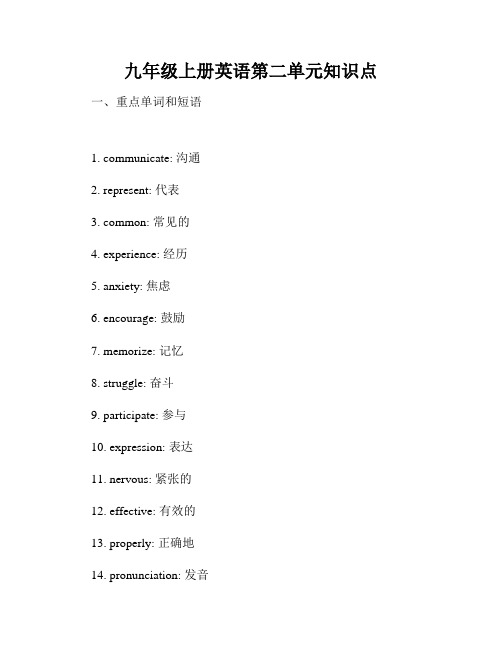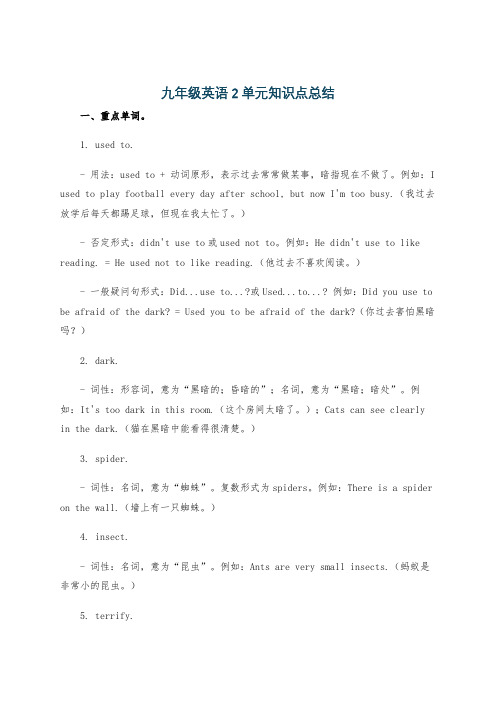九年级英语第二单元知识点
- 格式:doc
- 大小:42.00 KB
- 文档页数:3

九年级英语全册Unit 2知识点【Section A】一、重点单词及词组1.safety 意为“安全;安全性” , 作不可数名词时Safely adv.→反义词 dangerously adv.Safe adj.→反义词 dangerous adj.Safety n.→反义词 danger n.例:For your own safety, please do not smoke inside the plane.为了你自身的安全,请不要在飞机内抽烟。
2.smoke 意为“吸烟”,还可以指“冒烟” v.例:You had better give up smoking.你最好放弃吸烟。
What makes the stove smoke? 什么导致炉子冒烟?[拓展]smoke 用作不可数名词,意为“烟”。
例:The room was filled with smoke.屋里都是烟。
3.part-time兼职的 adj.其反义词是full-time,意为“全职的“。
Have part-time Jobs 意为“做兼职工作”。
例:In America, many students have part-time jobs.在美国,很多学生做兼职工作。
4.hug 拥抱,搂抱①[可数名词]拥抱 give sb a hug例:She gave her mother a big hug.她热情地拥抱了她的母亲。
②[动词]拥抱,其过去式和过去分词为hugged,现在分词为hugging。
例:They hugged each other.他们相互拥抱。
5.lift 举起,抬高;电梯,搭便车。
①[动词]举起,抬高;指用手或机器等把某人或某物举到一定等高度。
例:The old man can’t lift the box.这个老人举不起这个箱子。
She lifted her hand all of a sudden.她突然举起手来。

九年级上册英语第二单元知识点一、重点单词和短语1. communicate: 沟通2. represent: 代表3. common: 常见的4. experience: 经历5. anxiety: 焦虑6. encourage: 鼓励7. memorize: 记忆8. struggle: 奋斗9. participate: 参与10. expression: 表达11. nervous: 紧张的12. effective: 有效的13. properly: 正确地14. pronunciation: 发音15. progress: 进步二、重点语法1. 一般现在时:表示经常性、习惯性的动作或事实。
例如:She always gets up early.2. 现在进行时:表示现在进行的动作。
例如:They are playing basketball now.3. 一般过去时:表示过去发生的动作或状态。
例如:I saw a movie yesterday.4. 过去进行时:表示过去某一时刻正在进行的动作。
例如:She was studying when I called her.5. 一般将来时:表示将来要发生的动作或事件。
例如:We will visit Beijing next month.三、重点句型1. How do you communicate with your friends?你是如何与你的朋友沟通的?2. I usually talk to them on social media.我通常在社交媒体上与他们交谈。
3. English is important for communication.英语对于沟通来说很重要。
4. I have some experience in learning English.我在学习英语方面有一些经验。
5. Don't be nervous and just enjoy the process.不要紧张,尽情享受这个过程。

英语九年级全一册Unit2知识点Unit2是英语九年级全一册系列中的一个单元,着重讲解了一些重要的语法知识和词汇。
在本文中,我们将就该单元的一些重要知识点进行详细介绍。
一、动词的过去分词形式在Unit2的学习中,我们需要掌握动词的过去分词形式,因为它们在完成时态、被动语态等语法结构中起到关键作用。
动词的过去分词形式通常是加上ed、d或了的。
例如:1. play——played(玩——玩过)2. watch——watched(看——看过)3. do——done(做——做过)值得注意的是,也有些动词的过去分词形式要变化,需要特别记忆。
例如:1. go——gone(去——去过)2. eat——eaten(吃——吃过)二、目的状语从句Unit2中还介绍了目的状语从句的用法。
目的状语从句用来表示目的或意图,通常由连接词"so that"或"in order that"引导。
例如:1. He studies hard so that he can get good grades.(他努力学习,以便能取得好成绩。
)2. They saved money in order that they could go on a trip.(他们存钱以便能去旅行。
)目的状语从句在句子中起到修饰作用,使句子意思更加明确。
三、情态动词Unit2还介绍了一些情态动词的用法,如can、could、may、might、shall、should、will、would等。
情态动词在句子中表示说话人的意愿、推测、建议、允诺等情态。
例如:1. You should study hard for the exam.(你应该为考试努力学习。
)2. They may go to the park tomorrow.(他们可能明天去公园。
)情态动词在句子中的具体用法需要根据具体语境来理解和掌握。
四、描写性形容词和描写性副词在Unit2的学习中,我们还需要掌握描写性形容词和描写性副词的用法。

九年级上册英语第二单元2d部分知识点第二单元2D部分知识点九年级上册英语第二单元的2D部分是关于"Language Focus"的内容,主要包括动词的时态和用法、情态动词、虚拟语气以及间接引语等知识点。
下面我们将逐个进行论述。
1. 动词的时态和用法在英语中,动词的时态分为三大类:一般现在时、一般过去时和一般将来时。
一般现在时用于描述客观事实、习惯动作以及现在的状态等。
一般过去时则指过去发生的事情。
一般将来时用于表示将来要发生的事情。
例如:- I go to school every day.(我每天去学校。
)--一般现在时- He played soccer yesterday.(他昨天踢足球。
)--一般过去时- They will visit their grandparents next weekend.(下个周末他们将去拜访他们的祖父母。
)--一般将来时时态的使用要根据具体语境来进行判断,根据动作发生的时间来选择合适的时态。
2. 情态动词情态动词可以用来表示说话人对某个动作或状态的态度、推测、能力等。
常见的情态动词有can, could, may, might, must, shall, should, will, would等。
例如:- You can eat an apple.(你可以吃一个苹果。
)--表示能力- She may be at home.(她也许在家。
)--表示推测- They must study hard.(他们必须努力学习。
)--表示推测或义务情态动词的用法需要根据具体语境来判断,一般情态动词后面的动词使用原形。
3. 虚拟语气虚拟语气用来表示与事实相反的情况或者对现在或过去的假设、愿望、建议等。
虚拟语气包括过去虚拟语气和与过去事实相反的条件虚拟语气。
例如:- If I were you, I would study harder.(如果我是你,我会更加努力学习。

九年级英语unit2知识点总结九年级英语Unit 2知识点总结Unit 2是九年级英语中的一单元,内容主要包括一些日常生活中的常用英语表达和语法知识。
在这个单元里,我们将学习如何描述人物、事物以及地点,并且掌握一些重要的语法规则,比如名词的用法、形容词和副词的比较级和最高级等。
一、描述人物在Unit 2中,我们学习了如何用英语来描述人物。
要描述一个人,我们可以用外貌特征、性格特点、兴趣爱好等方面的词汇来进行描绘。
例如:1. 外貌特征:He has short black hair and wears glasses.(他有短发,戴眼镜。
)She is tall and has blue eyes.(她个子高,眼睛是蓝色的。
)2. 性格特点:He is kind and helpful.(他很友善,乐于助人。
)She is shy but very smart.(她很害羞,但非常聪明。
)3. 兴趣爱好:He enjoys playing basketball in his free time.(他喜欢在空闲时间打篮球。
)She loves reading and writing stories.(她喜欢阅读和写故事。
)二、描述事物除了描述人物,我们还可以用英语来描述事物。
在Unit 2中,我们学习了如何用形容词来描述事物的特征、颜色和大小。
例如:1. 特征描述:The car is fast and comfortable.(这辆车开起来快速又舒适。
)The house is big and spacious.(这个房子很大、宽敞。
)2. 颜色描述:Her dress is blue and beautiful.(她的裙子是蓝色的,很漂亮。
)The flowers in the garden are red and vibrant.(花园里的花是红色的,很鲜艳。
)3. 大小描述:The laptop is small and lightweight.(这台笔记本电脑小巧轻便。

九年级英语2单元知识点总结一、重点单词。
1. used to.- 用法:used to + 动词原形,表示过去常常做某事,暗指现在不做了。
例如:I used to play football every day after school, but now I'm too busy.(我过去放学后每天都踢足球,但现在我太忙了。
)- 否定形式:didn't use to或used not to。
例如:He didn't use to like reading. = He used not to like reading.(他过去不喜欢阅读。
)- 一般疑问句形式:e to...?或Used...to...? 例如:Did you use to be afraid of the dark? = Used you to be afraid of the dark?(你过去害怕黑暗吗?)2. dark.- 词性:形容词,意为“黑暗的;昏暗的”;名词,意为“黑暗;暗处”。
例如:It's too dark in this room.(这个房间太暗了。
);Cats can see clearlyin the dark.(猫在黑暗中能看得很清楚。
)3. spider.- 词性:名词,意为“蜘蛛”。
复数形式为spiders。
例如:There is a spider on the wall.(墙上有一只蜘蛛。
)4. insect.- 词性:名词,意为“昆虫”。
例如:Ants are very small insects.(蚂蚁是非常小的昆虫。
)5. terrify.- 词性:动词,意为“使害怕;使恐惧”。
常见搭配:terrify sb.例如:The loud noise terrified the baby.(巨大的噪音吓坏了婴儿。
)- 形容词形式:terrified(感到害怕的,用来形容人)和terrifying(令人害怕的,用来形容事物)。
九年级英语知识点第二单元第二单元: 九年级英语知识点1. 时态与语态 (Tenses and Voice)在英语语法中,动词时态和语态的正确运用是非常重要的。
以下是九年级学生在第二单元应该了解的时态和语态知识点:1.1 一般现在时 (Simple Present Tense)一般现在时用于表示经常性或普遍性的动作、情况或习惯。
它的结构是“主语 + 动词原形”。
例句:- She plays the piano every day. (她每天弹钢琴。
)- They live in a big house. (他们住在一所大房子里。
)1.2 一般过去时 (Simple Past Tense)一般过去时用于表示过去某个时间发生的动作或状态。
它的结构是“主语 + 动词过去式”。
例句:- He studied English last night. (他昨晚学习了英语。
)- We went to the beach last summer. (去年夏天我们去海滩了。
)1.3 一般将来时 (Simple Future Tense)一般将来时用于表示将来发生的动作或情况。
它的结构是“主语 + will + 动词原形”。
例句:- I will visit my grandparents this weekend. (这个周末我会去看望我的祖父母。
)- They will have a party for their anniversary. (为了他们的周年纪念,他们将会举办一个聚会。
)1.4 现在进行时 (Present Continuous Tense)现在进行时用于表示现在正在进行的动作。
它的结构是“主语 + am/is/are + 动词的ing形式”。
例句:- She is studying for her exam at the moment. (她此刻正在为考试而学习。
)- They are playing soccer in the park. (他们正在公园里踢足球。
九年级上册英语第二单元知识点梳理1. 词汇本单元主要涉及以下词汇:- appliance - 家用电器- behavior - 行为- daily routine - 日常事务- electronic device - 电子设备- etiquette - 礼仪- household chores - 家务事- manage - 管理- responsibility - 责任- schedule - 日程安排- task - 任务2. 语法本单元涉及以下语法知识:- 现在进行时:用于描述正在进行的动作或状态。
- 句型结构:主语 + am/is/are + 动词 + -ing。
例如:- I am watching a movie now.- She is studying for the test.- They are playing football in the park.3. 口语表达在本单元中,我们研究了一些日常生活中的口语表达。
- How do you manage your time? - 你是如何管理时间的?- What are your daily responsibilities? - 你的日常责任是什么?- Can you help me with this task? - 你能帮我做这个任务吗?- I need to do my household chores. - 我需要做家务事。
- It's important to have good etiquette. - 有良好的礼仪很重要。
4. 情景对话本单元涉及以下情景对话:1. 在朋友家拜访的对话2. 家庭成员分担家务的对话3. 大家分享日常事务的对话4. 讨论日程安排的对话通过这些情景对话,我们可以研究如何运用所学的语言知识来进行实际交流。
以上是九年级上册英语第二单元的知识点梳理。
希望对你的学习有所帮助!。
适用精选文件资料分享九年英 Unit 2 知点九年英 Unit 2知点一、要点短 the Lantern Festival元宵the Dragon Boat Festival端午the Water Festival水eat five meals a day一天吃五餐put on five pounds体重增添了五磅lose weight减肥in two weeks两礼拜此后be similar to...与.......相似throw water at each other相互水in the shape of...呈⋯的形状folk stories民故事lay out 开 ; 部署the story of Chang,e 嫦娥的故事refuse to do sth拒做某事have good luck in the new year在新的一年里有好运气end up 最成 ; 最后于 end up with以⋯束share sth with sb与⋯分享⋯as a result果one ... the other... (二者中 ) 一个⋯另一个⋯care about关怀 20. dress up装打扮haunted house 鬼屋play a trick on sb.捉弄某人give out 分 give up放弃trick or treat (万圣用)不糖果就蛋light candlesthe importance of⋯的重要性take sb around ⋯=show sb around ⋯某人到逛逛warn sb to do sth.警告某人做某事warn sb not to do sth警告某人不要做某事适用精选文件资料分享the beginning of new life重生命的开始remind sb of⋯使某人回想起⋯promise to do sth.承做某treat sb. with.用/以⋯待某人二、要点知点用法n.陌生人=strange(adj) + (e)r【拓展】异人 , 外处人 , 新来者I am a stranger here.我不是当地人.2.put on用法增添体重 ; 胖;穿上,戴上((作);演出,.put on的其余含:①穿上;戴上 My mother put on her coat and went out.②演出; One summer our children put on a play.3. steal用法vt., 盗取 stole ―stolen ;steal sth. from sb./sw.从某人或某地某物y out用法lay out开,部署lay out sth in sw将某物放在某lay v. 部署 , 部署 ,卵 , 下蛋 laid laidlie平躺 lay lainlie撒 lied lied5. admire用法vt. 欣 , 仰募 + sb./sth admire sb./sth for (doing)sth某事而恭敬 / 欣某人因( 做) 6. trick or treattrick n.把戏, treat用法:把不客就蛋play atrick on sb.捉弄某人n.款待, 款待v.款待, 客It’s my treat.我客treat sb. to sth某人吃⋯对待 ; 看作与 as 用treat ⋯ as ⋯把 .. 看作治 Which doctors are treating him for his illness.某人治7. punish 用法v.,be punished for因⋯受n. punishment adj. punishable的 , 可依法的8. warn 用法v警告, 告1)warn sb (not) to do sth.警告 , 告某人做某事2)warn sb. about sth .提示 / 告某人注意某事3)warn sb. of/ against (doing) sth .告某人防备某事4)warn (sb.)that从句9.dead 用法是形容,意“死的;失掉生命的”,常用于名前定或作系的表。
九年级英语第二单元教学知识点梳理Unit 2 I think that mooncakes are delicious! 短语整理•put on 增加(体重);发胖•lay out 摆开;布置•end up 最终成为;最后处于•Water Festival 泼水节•Mid-Autumn Festival 中秋节•Dragon Boat Festival 端午节•Chinese Spring Festival 春节•Lantern Festival 元宵节•Mother’s Day母亲节•Father’s Da y 父亲节•eat out 外出就餐•call out 大声呼喊•admire the moon 赏月•dress up (as) 装扮(成)•give out 分发•traditional folk stories 传统民间故事•the spirit of ……的精神/意义用法讲解•put on增加(体重);发胖o I’ve put on five pounds!o put on 穿上;戴上:She put on her coat.•lay out 摆开;布置o She laid out the forks.•end up 最终成为;最后处于o“If you go on like this you’ll end up in prison.”——牛津词典•Water Festival 泼水节o I know that the Water Festival is really fun.•Mid-Autumn Festival 中秋节o How do people celebrate the Mid-Autumn Festival?•Mother’s Day 母亲节/ F ather’s Day 父亲节o I heard that it is becoming more and more popular to celebrate Mother’s Day and Father’s Day in China.•dress up (as) 装扮(成)o They dressed up as clowns at the party.•give out 分发o Not only do people spread them around in different hiding places for a egg hunt, but they also give out these treats as gifts.重点句子•People go on the streets to throw water at each other. 人们走上街头互相泼水。
Unit 2
P10过去经常做某事 used to do sth.
习惯于(做)某事 be/ get used to (doing) sth.
过去常有 There used to be
被用来作某事 be used to do =be used for doing sth. 第一次 for the first time
四年以后 in ten years=ten years from now
看起来像 look like(指人的外貌,长相)
be like(指人的人品,个性等)
P11难道你不记得我了吗? Don't you remember me ? 等一等! Wait a minute!
弹钢琴 play the piano
踢足球 play soccer
对…感兴趣 be/became/get interested in
= take an interest in 对……失去兴趣 lose an interest in
对……没兴趣 have no interest in
在游泳队里 on the swim team
人确实是在变啊。
People sure change.
确信做某事 be sure of/about sth.
一定(不)要做某事 be sure (not) to do sth.
P12
非常害怕的;极度恐惧的be terrified of=be afraid of 因……而害怕 be terrified at
想到……而害怕 be terrified at the thought of
单独,独自 be alone
单独住 live alone
感到孤独 feel lonely
一个孤独的人 a lonely man
在众人面前说话 speak in front of a group
我开着卧室的灯睡觉。
I go to sleep with my bedroom light on. with+宾语+宾语补足语(形容词,副词或介词短语)
去睡觉 go to bed ----get up 指睡的动作
入睡 go to sleep =fall asleep---wake up 指由醒着进入
睡眠的过程。
熟睡 be (fast) asleep 指睡着的状态。
在电视上看watch …on TV
P13不喜欢体育课 hate/dislike gym class
步行上学 walk to school=go to school on foot
一直,总是 all the time =always
嚼很多口香糖 chew gum a lot
P14我最大的问题是我太忙了。
My biggest problem is that I’m too busy.
如此多的,这么多的 so much+un.
so many+pl.
如今,现在 these days
呆在学校 stay in school
整天 all day (long)
直接回家 go right home
不再 not……any more=no more
not……any longer=no longer
与某人聊天 chat with sb.
很少,难得 hardly ever
我确实怀念过去的日子。
I really miss the old days.
我变化真大呀! How I've changed!
在过去的几年里 in the last /past few years
我的日常生活 my daily life
我不介意。
I don't mind them.
忙于作某事 be busy doing sth =be busy with sth
P15使你紧张 make you stressed out
搬迁到 move to
似乎于梅已经改变了许多。
It seems that Yu Mei has changed a lot . P.16
一.惹大量的麻烦 cause a lot of trouble
给某人带来某事 cause sb. sth.=cause sth. to sb. The car caused the man a lot of trouble.=
使某人做某事 cause sb.to do sth.
What caused you to do that?
……的原因 the cause of……
Smoking is one of the causes of heart disease.
处于困境/苦恼中 be in trouble
自找麻烦 ask for trouble
一个十五岁的男孩 a fifteen-year-old boy
=a boy of fifteen years old
问题少年 problem child
改变某人的生活/命运 change one’s life
die 强调死的动作,非延续性动词。
dead 强调死的状态,延续性动词。
死了多长时间 have been +for +一段时间
=died +一段时间+ago
负担得起做某事 afford to do sth.
afford 常与can ,can’t, could, couldn’t, be able to 连用。
后接名词,代词,动词不定式。
支付她孩子的教育费用 pay for her child's education 为此 to do this
二.尽可能…as …as possible
=as …as one can/could
和…发生冲突 get into trouble with sb
对某人有耐心 be patient with sb.
有耐心做某事 be patient to do sth
放弃做某事 give up doing sth.=stop doing sth.
最后;终于 in the end =at last =finally
做决定;下决心 make a decision=decide
把某人送到某地 send sb. to someplace
一所儿童寄宿学校 a boys' boarding school 三.令某人惊奇的是to one’s surprise
懂得她为我付出了多少
understand how much she had given me 即使,纵然,尽管 even though=even if
对…感到自豪take pride in…=be proud of …
我作的每件好事 everything good I do
害怕独自一人呆着 be afraid of being alone
对…更注意,留心 pay more atte ntion to…
P17四
感到自信 feel good about oneself。